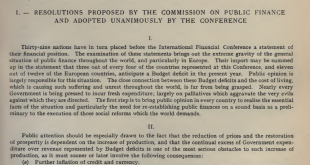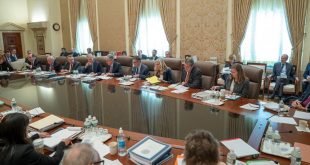By T.Sabri Öncü & Ahmet Öncü This article first appeared in the Indian journal, Economic and Political Weekly on 18 April 2020. The authors’ contact details are at he foot of this article.Abstract Based on the German Currency Reform of 1948 and the “Modern Debt Jubilee” of Steve Keen, a globally coordinated orderly debt deleveraging mechanism is proposed to address the global debt overhang problem. Since the global debt overhang and lack of sufficient climate finance...
Read More »Confronting twin perils of pandemic and austerity – some lessons from 1920 & 2020
Extract from Resolutions of Brussels International Financial Conference 1920 SummaryThe UK is experiencing, as a result of the COVID 19 crisis and response, its most severe economic downturn on record; the largest in the last century was in 1921, when annual GDP fell by 9.7%. In assessing the likely level of the fall, the Office for...
Read More »Here’s a Three-Step Plan to Take Back Control
The following article appeared on The Correspondent’s website on 17 April, 2020 With acknowledgement to HiltonT for the image of the President Steyn Gold Mine in Welkom, Orange Free State. I was born and grew up in a dusty, sparsely populated gold mining town on the bare and vast ‘veld’ of the Orange Free State, South Africa. As a child, my town’s dependence on the extraction of gold at a price fixed in Washington, opened my eyes to the architecture of the international...
Read More »Coronavirus could unravel globalisation
The following article was written for Tribune magazine, and published on 21 March, 2020. A heavy price is being paid by the world’s poorest for the ongoing commitment to the internationalisation of capital – and for the role globalisation plays in transforming epidemics into pandemics, and health crises into systemic financial crises. Millions of people living in low income countries are now threatened by the lethality of the corona virus; by economic failure at home, and...
Read More »Triggering a Global Financial Crisis: Covid-19 as the Last Straw
Photo - Black swans in Regent’s Park, London - by Jeremy Smith T. Sabri Öncü ([email protected]) is an economist based in İstanbul, Turkey. This article was written on 8 March 2020 and first published in the Indian journal Economic and Political Weekly on 14 March 2020.Whether a black swan or a...
Read More »Dealing with the overhang of non-financial private debt
Building on the International Monetary Fund (IMF) Global Debt Database (GDD) comprising debts of the public and private non-financial sectors for 190 countries dating back to 1950, Mbaye et al (2018) identify a recurring pattern where households and firms are forced to deleverage in the face of a debt overhang, dampening...
Read More »The End of Super Imperialism?
T Sabri Öncü ([email protected]) is an economist based in İstanbul, Turkey. This article was first published in the Indian journal the Economic and Political Weekly (EPW) on 28 September 2019.Summary: With intensifying concerns regarding the soundness and stability of the international monetary and financial system, calls for reforming it have been on the rise. One recent call was made by the Bank of England Governor Mark Carney, in August 2019, in which he suggested a...
Read More »Balance of Power: The Economic Consequences of the Peace at 100
My review of John Maynard Keynes’s The Economic Consequences of the Peace Macmillan (2019) appeared in Nature – the International Journal of Science – on 23 September, 2019.“Ann Pettifor finds astonishing contemporary resonance in John Maynard Keynes’s critique of globalization and inequity.”The Economic Consequences of the Peace John Maynard Keynes Macmillan (2019)In December 1919, John Maynard Keynes published a blistering attack on the Treaty of Versailles, signed in...
Read More »Thus Spoke the Bond Market
T Sabri Öncü ([email protected], @tsoncu) is an economist based in İstanbul, Turkey. This article was sent on 7 June 2019 and published first on 15 June 2019 in the Indian journal Economic and Political Weekly. Summary: Would market volatility amidst global trade tensions and uncertainty cause a global recession? Although...
Read More » Heterodox
Heterodox







